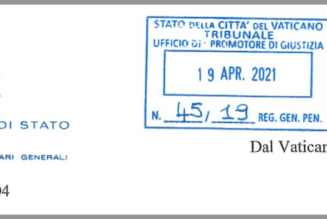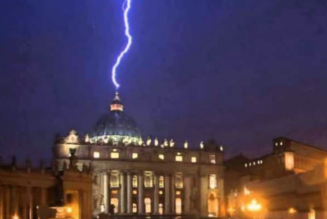
Cardinal Blase Cupich, not to be outdone (and outshone) by his confrere Cardinal McElroy, has recently penned a short essay criticizing “exclusion”. It asserts that the theology of the now conveniently deceased Pope Benedict XVI supports the view of Cupich that the Church should change her teaching that, prima facie, some sins bar one from Eucharistic communion. Cupich bases this analysis of Benedict on the late pope’s statements in Deus Caritas est about the infinite depths of the divine love and that this love, in a sense, trumps God’s justice.
Cupich therefore concludes that the late pope’s theology comports well with the notion that the Church should not adjudicate certain sins as incompatible with Eucharistic communion. It does not take advanced degrees in theology to see that the class of sins to which Cupich is alluding, in the not-so-coded language of inclusion, are the sexual sins which Cardinal McElroy has already identified as in need of a downgrading to venial status, if indeed still listed as “sins” at all.
Exclusion or confusion?
Of course, as an interpretation of Benedict’s theology this scarcely rises to the level of nonsense. Benedict is not talking about anything even remotely approaching Cupich’s thinly-veiled attempt to baptize the sexual revolution. Benedict, in Deus Caritas est, is instead speaking of the great theo-drama of salvation history wherein the divine freedom is contending with sinful human freedom, and which, via the various covenants, seeks to reconcile that sin with the divine justice without, for all that, dismissing its demands. And this then culminates in Christ and the paschal mystery where sin is transformed and defeated from within, thus opening up a new regime of grace where the Law of God will now be written on our hearts thus opening up for all of us the possibility of sanctification. But this path of sanctification is not an option and salvation must be appropriated in a lived, existential way. That is, after all, what the New Testament calls “being a disciple of Jesus”, and which the earliest Church referred to as “The Way”.
This is, quite simply, the Gospel with its dynamical interplay of sin and grace; redemption and judgment. It is the language, not only of Benedict, but also of St. Paul, the Fathers, Augustine, Aquinas, Bonaventure, and of all of the Councils and doctors of the Church. How, therefore, is it possible for Cardinal Cupich suddenly to discover that this grand theo-drama of salvation is a form of “exclusionary” speech at odds with the Gospel’s “inclusive” message of redemption?
According to Cupich, the Church’s traditional approach to moral theology evinces a form of exclusionary speech that seeks pharisaically to exclude whole classes of sinners (and, once again, here it is clear he means sexual sinners) by turning God’s justice against his love. The traditional teaching, by contrast, insists that God’s moral commandments about sex have not been nullified and negated by the grace of Christ, but deepened and given a new orientation toward love as the fulfillment of justice and not its contrary. Therefore, sexual sins are not a violation of certain “prohibitions” rooted in a harsh and heartless justice (as Cupich seems to think), but are rather violations of the demands of charity — a charity which is itself the fulfillment of justice and not its negation via some kind of supercession of love over the just demands of the moral law.
Therefore, in pitting God’s love against his justice—and misleadingly invoking Benedict to justify this move—Cupich is engaging in an implied Marcionism that sees the regime of Christ’s grace in the new covenant as a kind of de facto negation of the demands of the moral law in the old covenant. Pope Benedict never pitted God’s moral truth against God’s loving mercy as Cupich does here. Benedict does say that God’s love trumps his justice, but this is to emphasize the theological priority of the economy of salvation over the economy of perdition. It in no way implies that somehow the Church can now open the communion table to any and all regardless of their moral condition.
In reality, the entire Cupich essay remains on the level of a muddled mess so long as one tries to take it seriously as an actual attempt at theology. In reality, it is nothing of the sort, and I do not believe for one second that Cardinal Cupich really cares if the theology he is attempting to create here out of whole cloth—a theology of open Eucharistic table fellowship for almost all sexual sinners—is coherent. Because this level of sophomoric obtuseness is not an attempt at theology at all. It is a form of political rhetoric meant to make formerly rejected views palatable for the average Catholic via a sophistical word salad borrowed from NPR and other mouthpieces of the dominant cultural ethos.
Capitulation to the political spirit of our age
This bare-knuckled politics of a rather populist sort seeks to use the synodal way as a pretext for changing Church teaching in matters of sexuality to be in line with the sexual mores of secular modernity. This is an attempt at importing into the Church the modern Liberal political project of the imperial therapeutic self and the political cult of identity empowerment in the sexual domain that is, like the Nike swoosh, its iconic signature. To that end, Cupich is now cynically misusing, in the service of that politics, the theology of Pope Benedict for purposes that Benedict clearly opposed during his entire career.
This is big boy hardball politics and if we continue to engage the Cupich’s of the Church as if they are really proposing something theologically coherent then we will be tossing him slow pitches squarely over the middle of the ecclesial plate.
The late Italian philosopher Augusto del Noce wrote that the very essence of totalitarianism is the reduction of culture and religion to politics. This results in the nullification of Transcendence as a check on the totalizing claims of the political realm. Pope Benedict referred to this reality as the “eclipse of God” and that this eclipsing of Transcendence opens up an abyss of meaninglessness that acts as a corrosive acid dissolving every spiritual binding address that makes a claim upon us, and which alone can give us the proper moral teleology of our existence. This constituted for Ratzinger the true “signs of our times,” which is why he resisted the cultural Anschluss wherein the Church’s moral theology would be sublated into the political spirit of our age. Which is why he further repeated, tirelessly and with a strong percussive force, that the faith brings with it a counter-truth to that of the world. And the Church can never abandon said truth in the name of ersatz pastoral exigencies invented for the sole political purpose of undermining that same truth.
The attempt by Cardinal Cupich to bypass this central Ratzingerian insight about the abyss which modernity opens up beneath us represents a profound misrepresentation of the true orientation of his theology. In his marvelous Introduction to Christianity, Joseph Ratzinger speaks at length and with manifest poignancy about Saint Thérèse of Lisieux and her temptations to atheism and despair. And all of those temptations came despite the fact her entire life was framed by, and formed within, the matrix of a nurturing Catholic culture and family. Ratzinger states:
In other words, in what is apparently a flawlessly interlocking world someone here suddenly catches a glimpse of the abyss lurking—even for her—under the firm structure of the supporting conventions. In a situation like this, what is in question is not the sort of thing that one perhaps quarrels about otherwise—the dogma of the Assumption, the proper use of confession—all this becomes secondary. What is at stake is the whole structure; it is a question of all or nothing. That is the only remaining alternative; nowhere does there seem anything to cling to in this sudden fall. Wherever one looks, only the bottomless abyss of nothingness can be seen.
Therefore, one must understand the dictatorship of relativism that so concerned Ratzinger as merely a symptom of a much deeper rot. Because nobody is ever really a relativist. Ever. Relativism is always a subspecies of some kind of a deeper rejection, directed at the existing moral and spiritual ordo of a specific culture. And the rot of that culture, the Church’s culture included, with its hypocrisies, corruptions, inconsistencies, and manifest injustices, share deeply in the blame for the emergent “relativism” of those who reject the entire, tired monument of mendacity.
There are, of course, theoretical and philosophical relativists, but they do not seem to understand that if their thesis is “true” then they should stop writing and retire to the faculty lounge for a spirited discussion of linguistic theory, while drinking high-end bourbon out of a crystal glass made in a sweat shop, sitting on furniture made in a sweat shop, and wearing tweed suits made in a sweat shop. Nobody takes such pretentiousness seriously. But what we often call, too superficially, “relativism” in the broader culture, is in reality nothing more than the cri de couer of exhausted souls, living in an exhausted culture, and in search of alternative answers.
Heathenism entrenched in the Church
Nor is this phenomenon something unique to the post-conciliar era of the Church. Already, in 1958, the young Father Ratzinger made the following shocking observation:
The appearance of the church in the modern era shows that in a completely new way it has become a church of heathens, and increasingly so: no longer, as it once was, a church made up of heathens who have become Christians, but a church of heathens, who still call themselves Christian, but have really become heathens. Heathenism is entrenched today in the church itself. That is the mark both of the church of our time and also of the new heathenism. This heathenism is actually in the church and a church in whose heart heathenism lives. Joseph Ratzinger (Hochland, October 1958, quoted in Peter Seewald’s Benedict XVI: A Life, Vol 1, p. 296)
With these incendiary words, in an article refreshing in its unvarnished candor, written during a time when such things were just not said, Ratzinger burst onto the theological scene in Germany. All was not well with the Church, despite outward appearances, and Ratzinger was convinced that the Church was in a deep crisis of faith requiring an equally deep theological response. He goes on to say, with equal force and candor: “Heathenism is entrenched today in the Church itself. … This heathenism is actually in the church and a church in whose heart heathenism lives” (Seewald, 296).
This is a far cry from the misuse of Benedict by Cupich as a theologian open to the notion of a complete reworking of the Church’s moral theology and Eucharistic discipline, in order to make the Church more “inclusive” through the diminution of the importance of sexual sins. In reality, the program of inclusion called for by Cupich and McElroy is a doubling down on the very heathenism decried by Ratzinger in 1958. And it will result in a greater attenuation of our notions of Transcendence, which will lead to an ever greater eclipsing of God in the Church herself. It is a recipe for increasing the abyss of meaninglessness that haunts our time, since it removes the call to repentance and holiness for sinners and replaces it with the thin gruel of a therapeutic gradualism of the Law, eviscerating the latter of any real force.
What is lacking in Cupich and McElroy, in direct contrast to Benedict, is a piercing pastoral analysis of what has brought us to this point in the first place. Why is it that so many Catholics of deep faith have grown weary of the “business as usual” Catholicism of our parishes? And have felt the need to flee to an older iteration of the faith, in both liturgy and in theology, and who do so, not out of nostalgia for a past they never knew, but because they have found something there that rips open their souls with the passion of a lover? We can vent about the audacity of those who dare reject Vatican II, or who dare criticize the Novus Ordo, but it will come to nothing unless we own up to the failure to recognize that the anomic and nihilistic cosmos of post-modernity has laid waste to all of our standard structures of meaning—all of the traditions that embodied and made “real” that meaning, and all of the moral and spiritual weight of everything that came before five minutes ago.
The abyss of the “unreality of God” has seized our culture and also our Church. And it is causing countless Catholics to walk away from its insouciant cultural drivel. We wait in vain for a clarion call from the Church for a revolution of the soul, for a great night of collective repentance, for a great divestment of privilege, for a radical living of the Sermon on the Mount, or for the lifeboats to be dispatched forthwith to collect those adrift and drowning in the abyss of modernity’s rootless nihilism. But there is none of that, and instead we are being treated to an endless series of missives from high-end prelates on the glories of the synodal way as the antidote to the Church’s previous resistance to the sexual revolution and its harsh exclusion of those in “irregular” sexual arrangements from the Eucharistic table.
Ratzinger’s “abyss” is the deep existential reality of our time, and the strength of its rip tide requires an equally strong response from the Church. But the Church’s profound failure to ask the right questions has led to a failure to flip the script of our culture’s lies and deceptions, and Church leaders now seem intent on baptizing those illusions as movements of the Holy Spirit.
In the face of this abyss, we are in desperate need of the bread of the Gospel. But what we are getting are the stones of purely procedural and bureaucratic solutions. And the abyss beneath us deepens and grows wider with every assault on the Church’s moral theology in the name of some superficial “love is love” ideology dressed up, like a secular Infant of Prague, in differing forms of garb to suit the fashions of the moment.
Facing the spiritual crisis
What all of this points to is that the debates and controversies that we now see all around us are not going to go away until we start taking seriously the deep spiritual crisis that is at the core of every single one of them. We are not going to get anywhere so long as we persist in seeking bureaucratic or “structural” solutions to what are at root deeply spiritual problems. All that these so-called solutions will ever do is to deepen the abyss below us in direct proportion to how it hollows out the heavens above us.
The proposal of Cardinal Cupich, by pitting God’s love against his justice in order to justify open table fellowship for those engaged in objectively immoral activities, might seem at first glance as just the sort of non-bureaucratic “lifeboat” the Church needs to send out in order to rescue those drowning in the abyss. After all, mercy can be a deeply healing balm and the Church is in the forgiveness business. But moral antinomianism in matters sexual is not true mercy and is, therefore, not a lifeboat but a mirage that offers a false hope. It is honey laced with arsenic.
Pope Benedict XVI understood this. But there are many today who do not.
If you value the news and views Catholic World Report provides, please consider donating to support our efforts. Your contribution will help us continue to make CWR available to all readers worldwide for free, without a subscription. Thank you for your generosity!
Click here for more information on donating to CWR. Click here to sign up for our newsletter.









